That no news is good news. Nothing of real significance has happened over the weekend in Nepal's ongoing, slow-motion constitutional crises. If there were protests today or yesterday, I didn't see them, and it's tempting to think that we've dodged a political bullet here. Unfortunately, this country in desperate need of good government remains politically decapitated, with no Prime Minister, no ruling party, and certainly no one setting a comprehensive plan for ensuring "paani, bijuri, baaTo" (water, electricity and roads) for the 70% or so of population going without. Everyone who has a full stomach is fixated on the inter-party imbroglio; I presume everyone else is mainly preoccupied by coping with crippling fuel shortages and vegetable prices that have risen fivefold in the last month due to intermittent blockades of the trade roads to India.
So, in the absence of new news, I offer photos from last week's goofy yet absurdly well-coordinated street rallies. As I pedalled sweatily to work on Thursday the road, previously painfully thick with traffic, instead became this:
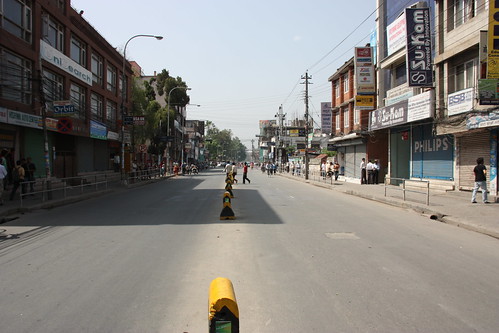
I've gradually learned that this is a bad sign during rush hour in Kathmandu, typically home to some of the worst traffic in South Asia (and by extension, the known universe). So I went wandering, and a block away found a Maoist rally, loud and surly but obviously well-disciplined and not visible hostile to my intrusions with my camera.
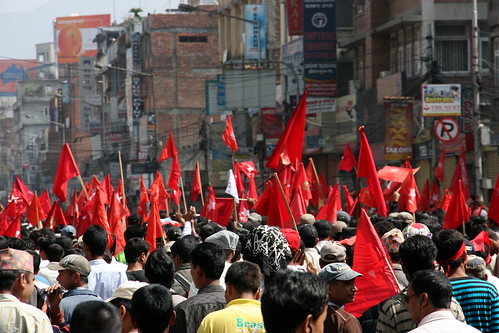
Police kept a conspicuously close eye on the whole process, maintaining a light human cordon around the entire moving crowd (which was perhaps five hundred people strong, though I've no real ability to estimate crowd size).
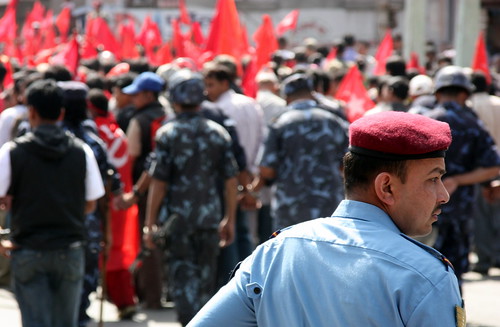
I wandered briefly alongside the crowd and then decided against making my way to work; there's no telling, on a day like that, when the return commute will be possible. En route back to my own neighbourhood, I encountered several dozen motorcycles, each carrying two men (one to drive and the other to wave the Maoist flag and yell). They'd pause every block or two to whip each other into a riotous frenzy and then continue on their way.

I have no idea what this guy said, but he really got the Motorcycle Maoists fired up.

They left rather unimaginative tags on the pavement as they paused - Y.C.L.N. is, you may have surmised, the Young Communists League of Nepak - the Maoists' unnervingly numerous and slavishly loyal youth wing.
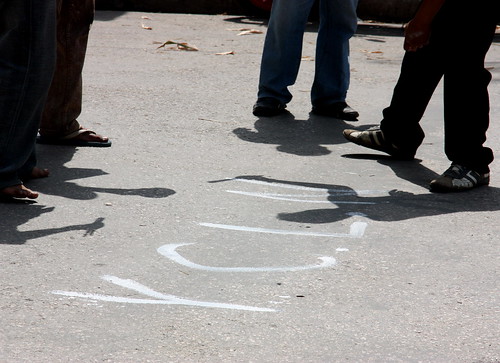
Once the motorcyclists passed, they were succeeded by another crowd of protesters, led by two rows of shirtless YCL drones bearing (I'm told, but could not read) high-minded satire written across their chests. They flanked a wheelchair-bound effigy of the reviled (by the Maoists) Ram Baram Yadav, leader of the opposition Nepali Congress party and a focal point in the vicious debate that precipitated all this lunacy. Of the wheeled impostor, however, I have no worthwhile photos. My apologies.
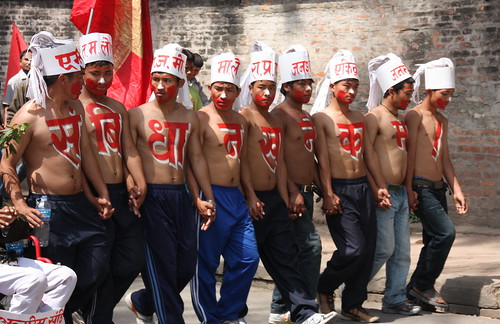
I was invited to join the protest (presumably with my shirt on), but demurred. And that was my Thursday, for I shortly thereafter fled back to the CECI office and my home. That was the last protest I've seen, though I'm told many more have taken place since then. We're still on tenterhooks here, waiting the next ill portent. It's likely to be the apparently imminent announcement of a coalition government between the (ideologically opposed) United Marxist-Leninists and the Nepali Congress, which will probably exclude the Maoists from seriously power and provoke another round of anarchy. I'm not putting any money on it, though - prediction is a fool's game here.
I'm sequestered at the CECI office right now in northern Kathmandu, across town from Worldview (my more permanent employer), where I fled after the lights went out and my laptop battery died. I crossed town accidentally (and miraculously) just before the storm of the century tore loose and turned the roads into opaque rivers. If you've never heard a serious hailstorm on a tin roof before, you'll need to seek it out. This is what the apocalypse will sound like. I'm hiding from the torrent of hail and the literally endless rumblings of nearby thunders, watching my bicycle submerge in the yard outside the window, and trying to figure out how to make the 5-minute ride home without drowning.